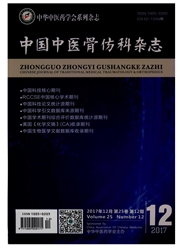

 中文摘要:
中文摘要:
目的:研究一氧化氮(NO)对兔纤维环细胞线粒体功能的影响及其与纤维环细胞生物学行为的相关性。方法:平板培养的兔腰椎间盘纤维环细胞,将其分为6组加入不同剂量的NO供体硝普钠(SNP)及烟酰胺:A组,不加入药物;B组,10μmol/LSNP;C组,100μmol/LSNP;D组200μmol/LSNP;E组,100μmol/LSNP和0.05mg/ml烟酰胺;F组,100μmol/LSNP和0.5mg/ml烟酰胺。作用72h后检测细胞增殖活力、细胞内ATP含量、细胞内一氧化氮合酶(NOS)活性以及线粒体膜电位。结果:兔纤维环细胞经不同浓度的SNP作用72h后,细胞内NOS量随SNP加大而增加、ATP量则随着减小,和对照组比较差异有统计学意义(P〈0.05);SNP组可引起纤维环细胞膜电位下降,烟酰胺组可减轻因SNP引起的膜电位下降(P〈0.05);与SNP组比较烟酰胺组呈浓度依赖性促进纤维环细胞增殖(P〈0.05)及改善纤维环细胞的增殖能力,两组间比较差异有统计学意义(P〈0.05)。结论:过量的NO可损害兔纤维环细胞的线粒体代谢功能,通过抑制NO的合成以及保护椎间盘细胞线粒体的功能,有助于预防椎间盘退变。
 英文摘要:
英文摘要:
Objective:To investigate the regulatory effect of nitric oxide (NO) on mitochondrial function and biological behavior of rabbit annulus fibrosus cells. Methods: Plate cultured annulus fibrosus cells of rabbit lumbar intervertebral disc were randomly divided into 6 groups: group A (the control group without drugs), group 13 (10μmol/L Sodium Nitroprusside, SNP), group C (100μmol/L SNP), group D (200μmol/L SNP), group E (administrating 100μmol/L SNP and 0. 05mg/ml Niacinamide), and group F (100μmol/L SNP and 0.5mg/ml Niacinamide). After 72 hours' culture, cell proliferation, intracellular ATP content, cell nitric oxide synthase activity, mitochondrial membrane potential were detected respectively. Results:After 72 hours, the intracellular cells NOS content increased and ATP content decreased with increasing concentration of SNP. There were significantly difference between control group and treatment group (P〈0. 05). Cell membrane potential decreased in SNP groups, which was reversed in Niacinamide group. Compared to SNP groups, Nicotinamide induced cell proliferation in a dose-dependent manner (P〈0.05). Conclusion: The excess NO can damage mitochondrial metabolic function of rabbit annulus fibrosus cell. Thus, inhibiting nitric oxide synthesis and protecting disc mitochondrial metabolic function might be effective to prevent disc degeneration.
 同期刊论文项目
同期刊论文项目
 同项目期刊论文
同项目期刊论文
 Development and evaluation of controllable axial loading-induced rabbit lumbar disc degeneration mod
Development and evaluation of controllable axial loading-induced rabbit lumbar disc degeneration mod Protective effects of Tanshinone ⅡA against interleukin-1 beta induced obstruction of energy metabol
Protective effects of Tanshinone ⅡA against interleukin-1 beta induced obstruction of energy metabol Adenovirus-mediated tissue inhibitor of metalloproteinase-3 gene transfection inhibits rabbit interv
Adenovirus-mediated tissue inhibitor of metalloproteinase-3 gene transfection inhibits rabbit interv 期刊信息
期刊信息
